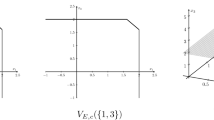Abstract
We discuss the relationship between bankruptcy problems and flow sharing problems, respectively, and show that the latter type of problem can be interpreted as a generalization of the former. The corresponding flow sharing game is convex, hence we can use the converse reduced game property to characterize the nucleolus and the constrained egalitarian solution. Our main contribution is thus to introduce the nucleolus as an alternative solution concept for flow sharing problems, and to offer a game-theoretic interpretation of the traditional egalitarian solution.
Similar content being viewed by others
Explore related subjects
Discover the latest articles and news from researchers in related subjects, suggested using machine learning.References
Aumann R, Maschler M (1985) Game theoretic analysis of a bankruptcy problem from the Talmud. J Econ Theory 36: 195–213
Brown J (1979) The sharing problem. Oper Res 27(2): 324–340
Chun Y (1999) Equivalence of axioms for bankruptcy problems. Int J Game Theory 28: 511–520
Curiel I, Maschler M, Tijs SH (1987) Bankruptcy games. Math Methods Oper Res 31: 143–159
Dagan N (1996) New characterizations of old bankruptcy rules. Soc Choice Welfare 13: 51–59
Dagan N, Serrano R, Volij O (1997) A noncooperative view of consistent bankruptcy rules. Games Econ Behav 18: 55–72
Dagan N, Volij O (1997) Bilateral comparisons and consistent fair division rules in the context of bankruptcy problems. Int J Game Theory 26: 11–25
Davis M, Maschler M (1965) The kernel of a cooperative game. Working paper, Princeton University
Driessen T (1991) A survey of consistency properties in cooperative game theory. SIAM Rev 33(1): 43–59
Dutta B (1990) The egalitarian solution and reduced game properties in convex games. Int J Game Theory 19: 153–169
Dutta B, Ray D (1989) A concept of egalitarianism under participation constraints. Econometrica 57: 615–635
Fujishige S (1980) Lexicographically optimal base of polymatroid with respect to a weight vector. Mathe Oper Res 5(2): 186–196
Herrero C, Maschler M, Villar A (1999) Individual rights and collective responsibility: the rights-egalitarian solution. Math Soc Sci 37: 59–77
Hokari T, Thomson W (2003) Claims problems and weighted generalizations of the Talmud rule. Econ Theory 21: 241–261
Ichimori T, Ishii H, Nishida T (1982) Optimal sharing. Math Program 23(3): 341–348
Maschler M, Peleg B, Shapley L (1979) Geometric properties of the kernel, nucleolus and related solution concepts. Math Oper Res 4: 303–338
Megiddo N (1974) Optimal flows in networks with multiple sources and sinks. Math Program 7: 97–107
Megiddo N (1977) A good algorithm for lexicographically optimal flows in multi-terminal networks. Bull Am Math Soc 83: 407–409
O’Neill B (1982) A problem of rights arbitration from the Talmud. Math Soc Sci 2: 345–371
Peleg B (1986) On the reduced game property and its converse. Int J Game Theory 15: 187–200
Thomson W (2003) Axiomatic and game-theoretic analysis of bankruptcy and taxation problems: a survey. Math Soc Sci 45: 249–297
Author information
Authors and Affiliations
Corresponding author
Rights and permissions
About this article
Cite this article
Bjørndal, E., Jörnsten, K. Flow sharing and bankruptcy games. Int J Game Theory 39, 11–28 (2010). https://doi.org/10.1007/s00182-009-0174-5
Accepted:
Published:
Issue Date:
DOI: https://doi.org/10.1007/s00182-009-0174-5




